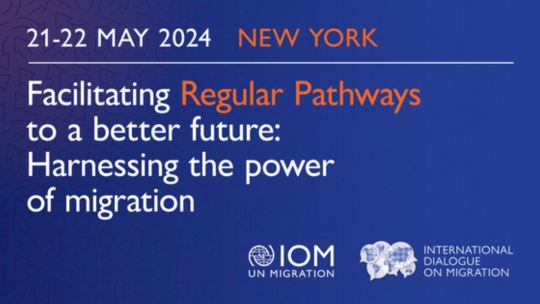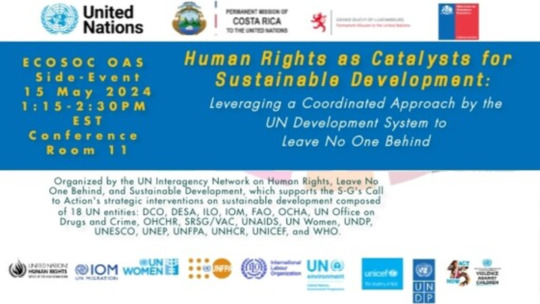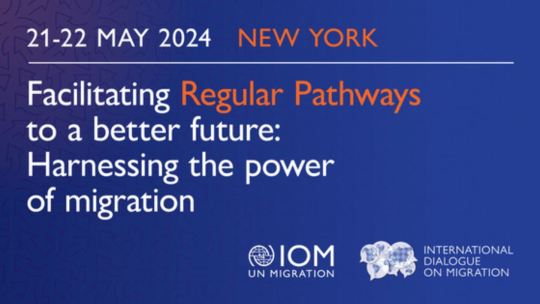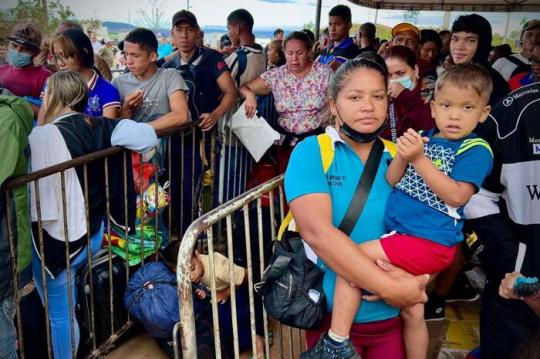#UN Migration
Explore tagged Tumblr posts
Text
The Role of Remittances and Diaspora Investments in Catalyzing Development Finance.
The side event aims to amplify the recommendations included in the policy brief that the IFAD and IOM have prepared to support Member States in preparatory processes for the 4th International Conference on Financing for Development.
Watch The Role of Remittances and Diaspora Investments in Catalyzing Development Finance!

#Diaspora Investments#Member States#conference room 8#UNHQ#Role of remittances#IFAD#UN Migration#Permanent mission of mexico to the united nations#financing for development
0 notes
Text
(2nd meeting) International Dialogue on Migration 2024 - "Facilitating Regular Pathways to a Better Future: Harnessing the Power of Migration".
International Dialogue on Migration (IDM) 2024 on the theme "Facilitating Regular Pathways to a Better Future: Harnessing the Power of Migration" (organized by the International Organization for Migration (IOM).
This session will contribute to:
An evidence-based understanding of the challenges and opportunities for migration today andtomorrow, including geopolitical crises and scaling-up of solutions, as well as ways to address gaps in current knowledge.
Identifying innovative and cutting-edge solutions that governments at local, national, and regional levels have already put in place or could develop in the future, to harness the potential of regular pathways for migration as part of a 360-degree approach to human mobility.
Unpacking how multilateral action and broad-based partnerships including private sector, diasporas and local communities, at the national, regional and global levels to facilitate regular and safe pathways for migration contribute to the response to some of the most distressing crises in the world, supporting integration and the transition to peace and prosperity.
Understanding how to achieve more accessible, people-centered, rights-based, accessible, sustainable and safe regular pathways, including key policy, operational and technical solutions that should be in place throughout the migration cycle.
Related Documents
Concept note
Watch the (2nd meeting) International Dialogue on Migration 2024!

#regular pathways#iom#regular migration#safe migration#orderly migration#power of migration#International Organization for Migration (IOM)#un migration#UNHQ#International Dialogue on Migration#migration#plenary meetings#peace and security#human rights#operational solutions#technical solutions#broad based partnerships#right based#people centered
0 notes
Text
Human Rights as Catalysts for Sustainable Development; Leveraging a Coordinated Approach by the UN development system to Leave No One Behind.
ECOSOC-OAS Side-event; conference room 11 - United Nations Inter-agency Network on Human Rights.
Watch Human Rights as Catalysts for Sustainable Development; Leveraging a Coordinated Approach by the UN development system to Leave No One Behind!

#Organization of American States (OAS)#ecosoc#un migration#un women#unfpa#ilo#unicef#undp#leaving no one behind#United Nations Inter-agency Network on Human Rights#conference room 11#united nations department of global communications#ohchr#sustainable development strategies#coordinated approach#human rights
0 notes
Text
8 notes
·
View notes
Text
.showering was a mistake we drew a parallel between youmjer and gaster, of all things
#.something something. both got poped out of existance (youmjer - couldn't migrate our old account so had to make youmjer_)#.(gaster had his Accident)#.both are somewhat connected to science#.etc etc anyways yea if there was a mcyt ut au then youmjer would very comfortably fit into gasters role. or the lack of#.except in youmjers case it got WAY FUCKING BETTER COMPARING TO GASTER#.FUCKER IS STILL FRACTURED ACROSS THE COSMOS#.YOUMJER IS DOING A JIG#.YEA YOUMJER IS PLURAL BUT IT WAS PLURAL EVEN BEFORE THE UN-EXISTING SO#mjers void choir
3 notes
·
View notes
Text

"Asylkompromiss" verhöhnt UN-Flüchtlingskonvention
Mehr Haft ist keine Lösung
Da diskutieren einige Bundesländer ob sie grundrechtswidrig die Präventivhaft für Jede/n von 2 auf 7 oder 14 Tage verlängern. Gleichzeitig sind sich die EU Staaten "einig" - eigentlich ist es nur die Niederlage des Rechts gegenüber den rechten Regierungen in Polen, Ungarn, Italien, ... - dass sie die Dauer der Grenzverfahren von bislang "nur" vier Wochen auf bis zu 12 Wochen verdreifachen.
Weiterhin wird allen "offensichtlich Unberechtigten" der Rechtsweg eines Asylverfahrens von vornherein genommen. Pro Asyl protestiert gegen diesen weiteren Abbau des Asylrechts genau 30 Jahre nach dessen formaler Abschaffung durch die damalige CDU Regierung unter Kanzler Kohl und beschreibt die Zustände an den Grenzen sehr realistisch:
„Wenn Menschenrechte verschwinden"
Es war ein langer Weg, die Menschenrechte international zu verankern. Marie Juchacz, Mahatma Ghandi, Eleanor Roosevelt, Rosa Parks, Martin Luther King, Nelson Mandela sind nur einige, die dafür gekämpft haben: Die Menschenrechte gelten für alle, das muss auch künftig so bleiben!
Diese Errungenschaft verspielt die Europäische Union heute. Indem sie unter dem Druck rechtspopulistischer Regierungen die Menschenrechte Schutzsuchender zunehmend außer Acht lässt. Indem sie bei Verbrechen gegen sie wegschaut. Indem sie das Unrecht sogar finanziert und legalisiert. Flüchtlinge werden an den Rändern der EU gedemütigt, geschlagen und gefoltert und immer wieder auch dem Tod überlassen.
Ein Beispiel: Im Oktober 2020 überqueren fünf Flüchtlinge die bosnisch-kroatische Grenze. Die kroatische Polizei nimmt sie fest und übergibt vier von ihnen an maskierte Personen, die sie grausam misshandeln. „Ich sollte mich bis auf die Unterwäsche ausziehen ... Zwei haben meine Arme festgehalten, zwei meine Beine. Vier andere haben auf mich eingeschlagen" - so berichtet einer der Betroffenen. Fast nackt und teils schwer verletzt werden die Flüchtlinge zurück auf die bosnische Seite verschleppt.
Den Schutzsuchenden gelingt später die Weiterflucht. Mit unserer Hilfe durchlaufen sie nun in Deutschland ihr Asylverfahren. Gleichzeitig geht PRO ASYL zusammen mit Partnerorganisationen gegen das Unrecht vor, das sie im EU-Mitgliedsstaat Kroatien erlitten haben: Im Dezember 2020 erstattet unser Partner in Kroatien, das Centre for Peace Studies (CPS), Strafanzeige, unter anderem wegen Folter, Misshandlung, Vergewaltigung, und Raub. Bis heute hat die kroatische Staatsanwaltschaft nicht reagiert. Ab Juli 2021 gehen wir zusammen mit dem CPS den Fall erneut an. Inzwischen liegen uns auch Schilderungen anderer Flüchtlinge über ähnliche Gewalttaten vor.
Im November 2021 verurteilt der Europäische Gerichtshof für Menschenrechte Kroatien erstmals wegen eines illegalen Pushbacks mit Todesfolge. Opfer war ein sechsjähriges Mädchen. Im April 2023 erheben die Geflüchteten beim kroatischen Verfassungsgericht Beschwerde wegen mangelnder Ermittlungen. Sie werden unterstützt von einem Netzwerk europäischer Menschenrechtsorganisationen, auch von PRO ASYL.
Kroatien wird trotz vieler Berichte über schwere Menschenrechtsverletzungen 2023 auch mit Unterstützung Deutschlands in den europäischen Schengen-Raum aufgenommen. Damit werden Kroatiens Verstöße gegen die Menschenrechte buchstäblich belohnt.
Wir sagen: So darf es in Europa nicht weitergehen. Wir alle sind betroffen, denn die Menschenrechte gelten für alle! Das absolute Verbot, Schutzsuchende an den Grenzen unter Gewaltanwendung abzuwehren, ist eines dieser wertvollen Rechte -ebenso wie der Anspruch auf ein faires und rechtsstaatliches Asylverfahren.
Auf der Webseite von Pro Asyl gibt es die Möglichkeit gegen solche Menschenrechtsverletzungen und den aktuellen "Asylkompromiss" mit einer Petiiton zu protestieren.
Mehr dazu bei https://www.proasyl.de/news/ausverkauf-der-menschenrechte-deutschland-stimmt-fuer-aushebelung-des-fluechtlingsschutzes/ und Petition unterschreiben https://aktion.proasyl.de/newpact/
Kategorie[21]: Unsere Themen in der Presse Short-Link dieser Seite: a-fsa.de/d/3uy Link zu dieser Seite: https://www.aktion-freiheitstattangst.org/de/articles/8427-20230612-asylkompromiss-verhoehnt-un-fluechtlingskonvention.htm
#Asylkompromiss#UN-Flüchtlingskonvention#Flucht#Haft#Folter#Außenlager#Kroatien#Ungarn#Abschiebung#Migration#Frontex#Fluggastdatenbank#EuroDAC#Europol#Schengen#VisaWaiver#Verfolgung
2 notes
·
View notes
Text
Comment Obtenir un Visa Travail au Canada : Le Processus Simplifié
Le Canada est l'une des destinations les plus populaires pour les professionnels internationaux souhaitant faire avancer leur carrière. Si vous êtes un travailleur étranger et souhaitez obtenir un visa travail pour le Canada, il est essentiel de comprendre les étapes du processus. Dans cet article, nous allons décomposer les étapes clés pour vous aider à naviguer facilement dans le processus de demande de visa travail, en rendant votre parcours aussi simple et rapide que possible.
1. Choisir le Type de Visa Travail
Le Canada propose plusieurs types de visas de travail, selon la situation spécifique de chaque candidat. Il est essentiel de choisir le bon type de permis de travail en fonction de vos objectifs professionnels et de vos qualifications.
Permis de Travail Temporaire (Work Permit)
Le permis de travail temporaire est le type de visa le plus couramment demandé par les travailleurs étrangers. Ce visa est accordé pour une période déterminée et nécessite généralement une offre d'emploi valide d'un employeur canadien.
Exigences :
Une offre d'emploi d'un employeur canadien.
Un Certificat d'acceptation du travail (si applicable).
Preuve de fonds pour subvenir à vos besoins au Canada.
Permis de Travail Ouvert (Open Work Permit)
Le permis de travail ouvert est une option plus flexible. Ce permis permet de travailler pour n’importe quel employeur au Canada sans restriction sur le type de travail ou l’emplacement.
Exigences :
Être un conjoint d’un citoyen canadien ou d’un résident permanent.
Avoir été étudiant international diplômé dans un établissement canadien.
2. Vérifier Si Vous Répondez aux Critères d'Éligibilité
Avant de postuler pour un visa travail au Canada, assurez-vous de remplir les critères d'éligibilité suivants :
Critères Généraux :
Passer un contrôle médical : Certains candidats devront passer un examen médical, en particulier ceux qui envisagent de travailler dans le secteur de la santé ou dans un environnement à risque.
Passer un contrôle de sécurité et de police : Une vérification des antécédents criminels peut être exigée.
Preuve d'emploi : Fournir des documents justifiant votre expérience professionnelle et la validité de l’offre d’emploi.
Documents Nécessaires :
Passeport valide.
Formulaire de demande de visa dûment rempli.
Preuve d'emploi officielle.
Preuve de fonds (pour montrer que vous pouvez subvenir à vos besoins pendant votre séjour au Canada).
Certificat médical et de police (si nécessaire).
3. Soumettre Votre Demande de Visa
Une fois que vous avez choisi le type de visa et rassemblé tous les documents nécessaires, vous pouvez soumettre votre demande de visa travail pour le Canada. Le processus se fait en ligne via le site officiel de l'immigration canadienne ou en soumettant une demande papier à l’ambassade ou au consulat du Canada.
Soumettre en ligne :
La soumission en ligne est l'option la plus rapide et la plus courante. Vous devrez créer un compte sur le portail de l'immigration canadienne, télécharger tous vos documents et suivre les instructions fournies.
Soumettre en papier :
Si vous ne pouvez pas postuler en ligne, vous pouvez soumettre une demande papier en l'envoyant au bureau de visa canadien de votre région.
4. Attendre la Décision
Le traitement des demandes de visa travail au Canada peut prendre de quelques semaines à plusieurs mois, selon le type de visa et la complexité de la demande. Pendant ce temps, vous pouvez vérifier le statut de votre demande en ligne.
Conseils pour Accélérer le Processus :
Assurez-vous que tous vos documents sont complets et correctement remplis.
Si des informations supplémentaires sont demandées, répondez rapidement pour éviter des retards.
Envisagez de faire appel à un consultant en immigration pour vous aider dans le processus.
5. Obtenir Votre Visa Travail
Une fois votre demande approuvée, vous recevrez une lettre d’introduction qui vous permettra de récupérer votre permis de travail à votre arrivée au Canada. Vous devrez également présenter votre lettre d’introduction aux autorités de l’immigration canadienne.
Conclusion
Obtenir un visa travail pour le Canada peut sembler complexe, mais avec les bonnes informations et une préparation soignée, cela devient une procédure beaucoup plus simple. Le Fonds d'Autonomie pour l'Afrique vous accompagne tout au long de ce processus en vous fournissant un service de préfinancement pour vous aider à couvrir les frais associés à votre demande de visa travail, à l'achat de votre billet d’avion et à votre logement une fois arrivé au Canada.
Prêt à démarrer votre parcours professionnel au Canada ? Contactez-nous dès maintenant pour obtenir plus de détails et commencer votre demande de visa travail pour le Canada.
#Visa travail Canada#Permis de travail Canada#Immigration Canada#Demande visa travail#Processus visa travail Canada#Conditions visa travail Canada#Visa Canada pour Africains#Emploi au Canada#Travailler au Canada#Exigences visa travail Canada#Demander un permis de travail#Permis de travail temporaire#Visa travail pour travailleurs étrangers#Guide visa travail Canada#Migration professionnelle Canada#Travailleurs étrangers au Canada#Programme de visa travail Canada#Obtenir un visa Canada#Demande permis de travail Canada#Opportunités de travail au Canada
0 notes
Text







Migration
Film // Película
#Migration#movie#film#pelicula#película#animation#animación#¡Patos!#Migración: Un viaje patas arriba#Migración Un viaje patas arriba
0 notes
Text
Land routes through Africa twice as deadly for migrants as Mediterranean ones – UN
The UN say more migrants and refugees are crossing dangerous routes in the Sahara, becoming subject to all kinds of violence, according to AP News.
Criminal gangs in the Sahara subject migrants to enslavement, organ removal, rape, kidnapping for ransom and other abuses, according to a UN report.
The report, released Friday by the UN refugee and migration agencies and the Mixed Migration Centre research group, estimated that land routes in Africa were twice as deadly as sea routes across the Mediterranean Sea.
New conflicts and instability in countries, such as Mali, Burkina Faso, and Sudan, fuelled an increase in travelling to the Mediterranean, the report emphasised. Nigeria, Ivory Coast, and Guinea were the leading countries of origin for migrants.
This comes as many politicians in Europe and beyond have fuelled or gained support from anti-immigrant sentiment in an important election year. However, conflict, economic discord, repression, and the effects of climate change in many countries in the developing world have nonetheless increased the flow of migrants across borders. This has led to greater risks of physical violence and fatalities.
Refugees and migrants are increasingly traversing areas where insurgent groups, militias and other criminal actors operate, and where human trafficking, kidnapping for ransom, forced labor and sexual exploitation are rife.
The authors recognise that complete statistics on deaths on land routes in Africa are not available. However, the United Nations High Commissioner for Refugees (UNHCR) has reported a more than threefold increase in the number of refugees and asylum seekers in Tunisia. It is a key transit country for migrants seeking to reach Europe. Read more HERE

1 note
·
View note
Text
100,000+ Cubans Obtain Humanitarian Parole in U.S.
As of the end of September, more than 100,000 Cubans had obtained humanitarian parole in U.S. [1] In addition, the U.S. has opened a new Safe Mobility Office in Ecuador where Cubans and others may submit U.S. asylum applications. Under the ‘Safe Mobility’ program, eligible refugees and migrants will be considered for refugee and humanitarian admission programs, and other avenues for legal…
View On WordPress
#asylum#Cuba#Ecuador#humanitarian parole#International Organization for Migration (IOM)#Safe Mobility Office#UN Refugee Agency#United States of America (USA)
0 notes
Text
Tumblr is coming back to life, I'm playing minecraft and thanks to my meds I'm not longer a mess, it's like I'm living in 2012 once again
#Bad bunny said that la vida es un ciclo and i think thats beautiful#Anyone else is with sertralina? Bc i wanna know if being unable of livinf without sweating is bc of the meds or bc the earth is dying#tumblr migration#minecraft
1 note
·
View note
Text
(1st meeting) International Dialogue on Migration 2024 - "Facilitating Regular Pathways to a Better Future: Harnessing the Power of Migration".
The International Dialogue on Migration (IDM) 2024 on the theme "Facilitating Regular Pathways to a Better Future: Harnessing the Power of Migration" is organized by the International Organization for Migration (IOM).
This session will contribute to:
An evidence-based understanding of the challenges and opportunities for migration today and tomorrow, including geopolitical crises and scaling-up of solutions, as well as ways to address gaps in current knowledge.
Identifying innovative and cutting-edge solutions that governments at local, national, and regional levels have already put in place or could develop in the future, to harness the potential of regular pathways for migration as part of a 360-degree approach to human mobility.
Unpacking how multilateral action and broad-based partnerships including private sector, diasporas and local communities, at the national, regional and global levels to facilitate regular and safe pathways for migration contribute to the response to some of the most distressing crises in the world, supporting integration and the transition to peace and prosperity.
Understanding how to achieve more accessible, people-centered, rights-based, accessible, sustainable and safe regular pathways, including key policy, operational and technical solutions that should be in place throughout the migration cycle.
Related Documents
Concept note
Watch the (1st meeting) International Dialogue on Migration 2024!

#UN Migration#International Organization for Migration (IOM)#International Dialogue on Migration#IOM#Power of migration#regular migration#regular pathways#multilateral action#diasporas#broad-based partnerships#safe migration#orderly migration#local communities#peace and prosperity#people-centered#right-based#integration#migration cycle#operational solutions#technical solutions
0 notes
Photo

Colombia: International support needed for Venezuelan refugees, migrants and their hosts Countries: Brazil, Colombia, Venezuela (Bolivarian Republic of), World Sources: International Organization for Migration, UN High Commissioner for Refugees Latin America and the Caribbean countries host 6 million Venezuelans who continue to struggle to meet their most basic needs, including food, health care, education and housing. https://reliefweb.int/report/colombia/venezuelan-refugees-migrants-and-their-hosts-need-help-chart-brighter-future
#Brazil#Colombia#Venezuela (Bolivarian Republic of)#World#International Organization for Migration#UN High Commissioner for Refugees#Protection and Human Rights#News and Press Release#ReliefWeb - Updates (Headlines)
0 notes
Text
3 notes
·
View notes
Text
LT Doodle Stream Recap/Questions!
(Part 1/Part 2)
Hello everyone! Wisteriasymphony here. Yesterday the LT hivemind had the wonderful experience of our first doodle stream together!

For the purposes of cataloging all of the questions we answered on our stream (because somebody doesn't know how streaming works yet *COUGH COUGH*), I'm going to be answering them all here!

La Terreur takes place in 2002, and the events of the timeline last about a year. Of course, it's a retrofuturistic cyberpunk-y 2002, which explains later developments like the alliance ring and so on.

They're the same au! Miracle Exposure has just been a tag Silu has used to categorize talking about the effects of the miraculous, but it all happens within LT.
Hawkmoth is already a pretty solid design as is. Shadowmoth and Monarch will probably get overhauls later on, but why fix what isn't broken? Hawkmoth is already just the right amount of gross and creepy and fancy and bald, so no need to revamp that.

The consensus to far is that Felix arrived before the quarantine was instated, but he could easily have bribed officials into letting him into Paris if he needed to. The quarantine is mostly to keep people in, and if some idiot with a death wish high-paying member of the british aristocracy is willing to give money to a dying city just for a ticket in, then why wouldn't they let him?

@gaussiansphere put it quite nicely in the stream when he said that the heroes aren't trapped in Paris physically, but mentally. There's nothing theoretically stopping Ladybug from blowing a hole in the defenses of Paris and going on the run, but she has a moral obligation to protect her city. Everyone else feels roughly the same way, though we did discuss the idea of having the concept of migration fit Max better by virtue of his big goals in life involving getting out of Paris.
Also, the miraculous will likely be passed out differently. We're not following exact episodes, only storylines.
On a similar note....

Ladybug will probably alternate who she gives all of the minor miraculous to multiple times over the course of the story. She would find it ridiculous to pass them out to people "for keeps", as @sillysiluriforme put it, and before a certain point in the story will favor adult holders over teen holders. (Not saying why this changes though heehee, spoilers.)

MUCHAS GRACIAS!!!!!!!!!! Los ships no son un foco de La Terreur, pero.. Adrigaminette 100% mejor del mundo JAJAJAJA XP. de lo contrario es lo mismo que el canon.
Opinions de los kwamis hacia sus portadores es q los ven como niños. Son indiferentes a la humanidad en realidad. Los kwamis también los vicios q usan sus portadores para obtener. (Adrien huele a tabaco Y queso apestoso :/ Marinette no se afectada porque Tikki quiere el sabores dulces en su vaporizador).
#wispanol arc hehe. also YES you saw that right English audience, the kwamis are smokers. Marinette has to ask Luka's bandmates for vapes because the closest bodega to her house is run by a sweet Chinese grandma who her mom likes talking to, so if she bought from there she'd be absolutely screwed. Adrien just buys all of the tobacco as Chat, though.

We're not planning on having Aspik show up in LT, at least as far as we have planned. If he did, however, his rat eating desire would definitely go through the roof. He'd probably try and time his rat-eating specifically for when he's Chat Noir, just to make things easier for himself. (Until he eats one as Adrien by accident and has to live with the mental baggage for the rest of his miserable little life...)

Well.. there are a lot of characters that really don't need redesigns! Or where redesigns would be extremely minimal. Marinette's dad only really needs to get proportional legs and then that's it, and the same philosophy extends to most of the other minor characters.
Here are some of @clemnoir's designs for the rest of the class, though!


In fact, her lovely annotations somewhat answer another question we received....

We haven't figured out everyone yet, but the scholarships group so far is: Kim, Max, Ivan, Rose, Nathaniel, and Mylene. Adrien, Chloe, Sabrina, Alix, and Marinette are all paid tuition.

There could be! The ancient miraculous are indeed destroyed, much like the infinite amount of others like them, Bearinette and Lambdrien are just explorations of what it would be like if they hadn't been. The bear and lamb miraculous are not canon to LT, nor would any future ancients be. If we get any good ideas, you'll see them.
[wis is biting all of her fingers to prevent herself from talking about the coyote....]

The big issue Marinette has with being Multimouse is that she's no longer respected as the leader, at least as much as she's used to. Because she sees Ladybug as more of a responsibility than fun superpowers, her side effects are more psychological by consequence, whereas Adrien's are more physical. She also feels some sense of jealousy towards Scarabella, as well as general insecurity over not being the leader when she's Multimouse... but despite this she continues to use the Mouse Miraculous more often than in canon just for the sake of "training" Alya.

Silu dice muchas gracias!!!!! ...No conocen sus identidades fsgdss. Exposición al milagros del raton causa disocociación, duplicación no literal para Marinette jajaj. (Pero, no puedo decir si dos Marinettes aparecen en LT..... tal vez, tal vez no? huummmm)
Tambien, ellos comiendo ratones en privado. Nadie los trae en su almuerzo. Todos ellos tratan con sus síntomas en secreto.

Violence and misery and horror and class dynamics. I'll get into it more in Part 2, but characters' relationships to power is a huge part of this AU, both of the magical and non-magical variety.
619 notes
·
View notes
Note
could you expand / share reading materials on "gender is a structure that mediates access to personhood"? i feel like that's an important point that i don't fully grasp. especially because it is my understanding that until relatively recently even white, bourgeois, cis-heterosexual, perisex etc women were also denied personhood, but were already gendered as women, right?
thanks in advance!
I’m so sorry you sent me this ask like three months ago and I’m only getting around to it now lol
This is going to be a long post. I will be talking a lot about citizenship and rights in this post. I’ll include citations, but two overarching texts I will be engaging with a lot are Unequal Freedom (2004) by Evelyn Nakano Glenn and The Three Worlds of Welfare Capitalism (1989) by Gøsta Esping-Andersen.
This is also not meant to be a comprehensive answer to your question. I am much less familiar with migration & refugee scholarship, which is obviously deeply engaged with the concept of citizenship as an apparatus for granting rights. I’m flagging this because my answer has a particular focus that is not generalisable. Everything I say is not “the answer” to your question, but an answer informed by specific domains of scholarship.
First, I think a good place to start is that when we talk about ‘personhood’ as a status that a human being can or cannot possess, we are often talking about a status that is realisable through citizenship. ‘Personhood’ is itself a legal term, and we can see this in how stateless people (i.e. people with no citizenship) are treated - because rights are granted by and administered through states, being without state citizenship means you are unable to realise any set of rights, and therefore, you are rendered as a non-person. The UN has two separate conventions on the rights of stateless people for example, as being stateless is necessarily an international issue. I think this approach helps makes sense of why “human rights” is a popular framing in discussions of how to remediate inequality (e.g. “trans rights are human rights”). The “human” part of that equation is only realised through the attainment of “rights,” i.e., through citizenship. Citizenship = personhood can also be seen when people invoke “second class citizens” as an articulation of legal, political, and societal discrimination - i.e., groups of people who have less/no access to rights compared to other groups within a state. Systems of classed citizenship often emerge from regimes of settler colonialism, slavery, and apartheid (Glenn discusses this in her book).
The basic Marxist intervention in this discussion is that this class system still exists even in places that have abolished slavery, abolished apartheid, and/or gone through formal decolonisation, because state law under capitalism is fundamentally unjust. Marx calls law the “mystification of power” (I believe he says this in The German Ideology? I'm rusty on my Marx readings lol) - he argues that law is a bourgeois system of justice that caters to the wealthy and powerful and disenfranchises the poor and marginal, but appears as neutral and fair through a liberal “theater” (Marx’s term from The 18th Brumaire) of equality and democracy, mystifying its actual effects and purpose (The Red Demiurge (2015) by Scott Newton is a book about Soviet legal history that goes into some of this. His focus is on the evolution of the Bolshevik relationship to law as the USSR developed and encountered quite literally new legal problems that emerged as a result of the formation of a socialist state). This is also part of the Marxist critique of nationalism - if state citizenship is what grants access to rights, and citizenship is classed (through your relationship to production, through white supremacy, through patriarchy, through colonial status, through religious status, through etc), then equality does not legally exist, that all equality is bourgeois equality, i.e., not universal, not equal.
Gøsta Esping-Andersen provides a really helpful theory of thinking about citizenship rights within a capitalist state (his book only focuses on Western imperial core states, so just flagging that lol). He begins by arguing that:
all markets are regulated by the state, there is no actual “free” or anarcho-capitalist market,
because of this necessary regulatory function provided by the state, the commodity of wage-labour (i.e., the process of selling your labour-power as a “good” or commodity on a market in exchange for money in the form of wages) is likewise always regulated to some degree, and so finally,
welfare should be understood as the regulatory system of the commodity of wage-labour.
This regulatory apparatus is what grants people “social citizenship rights” - sick leave, pensions, disability and unemployment insurance, welfare payments, food stamps, tax bracket placements, childcare, healthcare, education, housing, so on and so on. Within this framework, Esping-Andersen demonstrates that various welfare regimes produce different citizenship classes - Canada, Australia and the US, for example, explicitly reproduce an impoverished “welfare class” through a marginal, means-tested welfare regime that only provides benefits to the very poorest. Various European countries by contrast tend to have what he calls a “corporatist” welfare regime that often grants different social citizenship rights based on which occupation you have, which he argues emerged from feudal and pre-capitalist religious (esp. Catholic) social forms of organisation.
ANYWAY, the purpose of doing all that set-up is to contextualise how we arrive at the question of gender. Feminists make the basic point that citizenship is also classed by gender - in Unequal Freedom, Glenn talks about this in the US, where white women were legally treated as extensions of their husbands and had no access to property rights, voting rights, and so on. Black women, in contrast, were treated sexually as women by slaveholders (i.e., raped and abused) but denied any and all personhood on the basis of their slave status. Citizenship in the US was historically based first on your ability to hold property (reserved for white bourgeois men), and then on your ability to “freely sell” your labour-power on the market - white women were denied citizenship on this basis because they were consigned to managing what was defined as the “private realm,” i.e., the realm that houses free labourers (white men). This public/private distinction emerges through capitalist markets and the commodity of wage-labour, which produces a sharp distinction where productive labour takes place “out there” (paid for in wages by the capitalist class) and reproductive labour takes place “in here” (i.e., labour that is not paid for in wages* by the capitalist class and forms the social basis of reproducing the public labour pool).
*for white women. see below
As Glenn argues, this public/private distinction in the US is fundamentally racialised. We can see this difference in the emergence of the suffragette movement, where white women appeal to their whiteness (i.e., free labour status) as the rationale for being granted the right to vote. Black women were disqualified from this movement, and did not benefit from white women’s demands for equal citizenship on the basis of them providing all this unpaid reproductive labour to their white husbands, as Black and other racialised women often provided domestic housekeeping labour for white women (unpaid during slavery and for indentured servants, for wages after its abolition). This leaves Black women without a private realm, subjecting them to a “purely public” arena that is uniquely difficult to organise for unionisation and/or improve working conditions (Deborah King talks about this further in Multiple Jeopardy, Multiple Consciousness (1988)).
Trans-feminism explicates this further - coercive sex assignment at birth classes people on the basis of reproductive capacity. “Females” are impregnated, “males” do the impregnating. This particular system of sex assignment is deeply tied to colonial population management concerns, where measuring the labour capacity of colonised subjects was a matter of managing white wealth (as well as making sure “there weren’t too many of them” compared to white people in colonies - this was especially a major white anxiety after the Haitian Revolution at the turn of the 19th century, the largest slave revolt in history. See Settlers by J Sakai). You can read Maria Lugones’ papers The Coloniality of Gender (2016) and Heterosexualism and the Colonial/Modern Gender System (2007), Alex Adamson's (2022) paper Beyond the Coloniality of Gender, and Guirkinger & Villar's (2022) paper Pro-birth policies, missions, and fertility for some introductory reading.
(Note: patriarchal gender hierarchies predate and exist outside of European colonial domination - it is a popular white queer talking point that Europe invented gender, that indigenous peoples actually all had epic radically equal genderfuck systems that were destroyed by Europe, and this is a very patronising and racist historical generalisation that I want to avoid making. Third World/Global South feminism is a necessary corrective to this - an arena of scholarship I am sadly not well versed in. Sylvia Wynter is the only scholar I’ve engaged with on this topic, which again, is a very limited slice. I welcome reading recommendations in this area).
While sex assignment is coercive for everyone, it is a particular problem for trans people, who are accused of impersonation and ID fraud if our sex markets conflict with our gender presentation, or we don’t “look like” our sex marker to cis people. Because you need a government ID to do basically anything - getting a job, applying for an apartment, getting a driver’s license, going to school, buying a phone plan, being on unemployment, applying for disability, filing an insurance claim, doing your taxes, opening a bank account, getting married, going to the hospital, buying lottery tickets at the corner store, etc - and sex markers appear on basically all government ID in many countries, trans people are systematically denied a whole range of citizenship rights (and thus personhood) on the basis of this sex assignment. Trans people are not merely treated as the wrong gender, they are ungendered, and by this process, rendered ineligible for personhood. Like just as an example, gay marriage is a luxury to trans people, as gay marriage is based on the state recognising both you and your partner’s gender in the first place. (See Heath Fogg Davis’ paper Sex-Classification Policies as Transgender Discrimination (2014) for example. Butler also talks about this on a more fundamental level in Bodies That Matter (1993), and Stryker & Sullivan also discuss this in The Queen's Body, the King's Member (2009)).
This is likewise the impetus behind anti-trans bathroom bills and sports bans - citizenship guarantees, among other things, a right to public space, and these bans are meant to deprive transgender people access to those spaces. These bans should be understood as a way of circumventing the much more difficult process of revoking the citizenship of trans people outright by using a component of citizenship (sex assignment at birth) to impoverish the quality of citizenship that trans people have access to. This is why bans on medical transition are not actually just about medical oppression, but the oppression of trans peoples’ abilities to live in society in general. An instructive parallel is abortion bans for pregnant people, who, in addition to facing medical oppression and violence by being denied healthcare, are likewise systemically marginalised through being forced into the role of “mother” (again we see how cissexualism reduces people to reproductive capacity), economically marginalising them by reducing their capacity to earn a wage, tying them to partners/spouses that now have greater economic and social leverage over them (and thus have greater capacity to assault, rape, and murder them), depriving them of the choice of alternative life paths, and so on.
It’s generally much more difficult to get the state to sign off on unilaterally oppressing a group of citizens by depriving them of citizenship completely, so attacking a group through more narrow and particular policies like healthcare or the use of public space (with the ultimate goal of depriving them of their rights in general) is often much easier and more productive. See Beauchamp's 2019 book Going Stealth: Transgender Politics and US Surveillance Practices, who talks about this in the context of anti-trans bathroom bills in chapter 3. This is also a common thread in disability scholarship, as disabled people are likewise denied much of the same citizenship rights through similar logics - the book Absent Citizens (2009) by Michal J Prince talks about this in the Canadian context. To give an example he uses in the book, in Canada, accessible voting stations were only federally mandated in I believe the 90s, meaning that disabled people were practically disenfranchised until about 30 years ago in Canada, even though there were no laws explicitly banning disabled people from voting.
As a result, any barriers put in place by the state to change your legal name and sex marker should be understood as a comprehensive denial of personhood, not only because we as trans people want our IDs to reflect who we are, but because those barriers make it difficult to do literally anything in civil society. This the basis behind the cry of “trans rights are human rights” - taking away our healthcare rights also fundamentally denies us equal citizenship (and thus personhood), because healthcare is where we get all those little permission slips from doctors and psychologists to change our name and gender marker in the first place. This is of course not remotely the same as being made stateless (trans refugees are placed in a particularly harrowing and violent legal black hole, for example) - I as a white trans person living in the imperial core still benefit from a massive range of material, political and social privileges not afforded to many others, but my transness positions me at a deficit relative to cis people who have the same state citizenship as I do. As I hope I've made clear, it's not a binary case of either having or not having citizenship, but that citizenship is classed, and the quality of your citizenship is heavily dependent on a whole range of social, political, legal, economic, and historical factors that are all largely out of your control.
So not only is gender a barrier to citizenship, it mediates access to realising the full range of personhood within a regime of state citizenship. Trans people are not the only group effected by this, as I described above, but trans people are a group that makes obvious the arbitrary, coercive, and unequal nature of sex assignment through its connection to state citizenship.
236 notes
·
View notes